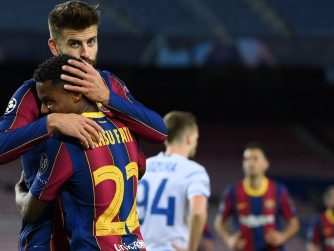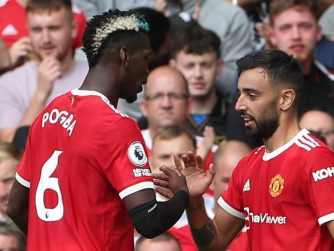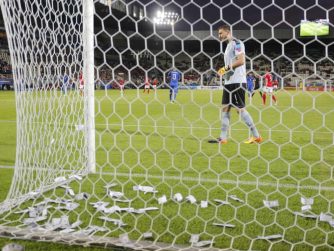Jose Mourinho and Pep Guardiola. Two of the winningest current managers in world football, with 52 trophies and six world’s best club coach awards between them, share a rivalry synonymous with modern football.
While the clashes seem to have to lost its verve in recent years in part due to the stark contrast in fortunes of the two managers, a retrospective outlook may just add more credence to its relevance.

Laudation reigned before rivalry. Mourinho joined Barcelona in 1996 as a translator for Sir Bobby Robson while a certain Spaniard played for the Blaugrana. The Portuguese sensed Guardiola to be brimming with leadership qualities as the two developed admiration for each other. Mourinho stayed on after Robson left, now under the tutelage of Louis Van Gaal. Barcelona meant a lot to Mourinho. It did until the club rejected his pitch to become the manager of the club, instead opting for an inexperienced Pep Guardiola.
Mourinho relished every opportunity to best the side that renounced him. Look no further than the 2010 Champions League semi-finals as a Mourinho masterclass ousted the almighty Barcelona. If you wonder how much it meant to the Inter manager, a sprightly sprint across Camp Nou with his finger raised as Barcelona players try to put an end to the shenanigans should suffice it.

The season after, Mourinho took over as manager of Real Madrid, drawing a line in the sand. While head-to-head results may favour the Spaniard, both shared a domestic title apiece in the two seasons they went toe-to-toe. A one-off bout in the UEFA super cup saw Pep’s Bayern side emerge victorious in penalties against Mourinho’s Chelsea in 2013. In 2016, the fire was reignited at the biggest stage as Mourinho took over as Manchester United manager while Guardiola joined the noisy neighbours, a phase of their rivalry that barely existed and ultimately fizzled out.
Neither side shied away from taking jabs at the other, literally at times in the case of Jose Mourinho if you ask Tito Villanova. Pep regarded Mourinho as the boss off the pitch, saying “In this room, Mourinho is the f-ing chief, the f-ing boss. I don’t want to compete with him in here… but this is a game of football.” Mourinho denounced Pep’s claim to love the beautiful game. Incessant bickering and snide remarks became part and parcel of their relationship.
What started off as a friendly working bond devolved into a grimy, at times personal conflict between two of the best. However, none of it comes as a shock. The two managers stand antithetical to each other. Possession football against a composed counter-attack. Someone who does his talking on the pitch while the other has the gift of the gab. Someone whose career has revolved around success against someone who has paved his way through adversity.
The two could never see eye to eye. Yet, their dwindling paths may just converge sooner or later. The signs lay in hindsight.

“I am not one of the bottle, I think I am a special one.”
The epoch-making words of the Portuguese manager after a groundbreaking stint at Porto where he managed to win the Europa league and the Champions League are telling, not just of his magnetic aura, but also of the outright confidence in his ability. Mourinho, with a keen eye, an unmilled mouth and a winning mentality, took clubs to new heights. He led Porto to an unforeseen Champions League win in 2004. He won two Premier League titles back to back with Chelsea along with a domestic double, laying the foundation for the Blue’s eventual European success. In 2010, he guided Inter Milan to their first Champions League win in 35 years and in domineering fashion, picking up the treble. Mourinho had the world in his palm. Talk the talk, walk the walk. Brimming with charisma along with the ability to back it up.
Enter Real Madrid.

“I want to be where fans love me”, said Mourinho near the end of his final season for the club in 2013, a rather unfortunate summary of a successful stint at the club.
While winning La Liga in record fashion and the Copa Del Rey in his three-year stint, the institution that is Los Blancos ate at him. Rifts with players and media became commonplace. Hostility towards players he considered disloyal along with the fans slowly turning on him in his final season rendered a return unfeasible.
He returned to the Premier League next season, back to Chelsea, a country and a club he thought would show him the respect he deserved. However, it seemed like the damage to his demeanor was irreparable. Cynicism took over the usual hubris. An argumentative stance took over a captivating one. However, the Portuguese won another Premier League title with the Blues. The team looked exhausted by the end of an arduous campaign. An insipid transfer window followed, sending a depleted Chelsea side into next season. Mourinho started to lose the dressing room who grew weary of the hostile situation with the manager. By December, Chelsea were teetering above the relegation zone, which led to the first sacking of Jose Mourinho’s career. Manchester United followed, a tenure which saw the side reach second in the Premier League and a subsequent Europa League which in retrospect, was a successful reign. However, a similar pattern to what happened in Chelsea followed, leading to his sacking in 2018.
All things considered, Mourinho left every club in a better shape than when he took over. His demeanor and unabashed candidness soured him to fans and media, undermining his absolute success.

“If there isn’t a sequence of 15 previous passes, a good transition between attack and defence is impossible. Impossible.”
A quote from the book “Herr Pep” is Pep Guardiola personified. Honing his craft under the Great Johan Cruyff and his “total football”, Pep revolutionized modern football with his implementation of possession style of play. With mercurial talents in the likes of Lionel Messi, Andres Iniesta, Xavi and David Villa to name but a few, Barcelona became an unrelenting force, picking up three league titles and two Champions League trophies, setting him and the team apart. After a sabbatical, the Spaniard joined the treble winners, FC Bayern in 2013, taking over from the legendary Jupp Heynckes. Administering his ebullient possession-based football, the side flourished and managed to win consistent Bundesliga titles. However, for a side like Bayern, European prosperity was deemed as the barometer for success, an area where Pep has struggled since the glory days of Barcelona.
His next destination was Manchester City, a side ever so close to European success. Pep flaunted his finesse and precision as the Sky Blues rose to rule the league. Two Premier League titles, one in dominating fashion, breaking the 100 point barrier. The Centurions managed a domestic quadruple as well. However, the emphasis comes onto the word, “domestic”. The Champions League eludes Guardiola and Manchester City, recently losing in a rather unbecoming fashion to Lyon. There must be an explanation.

Pep Guardiola crafted his style with the perfect personnel for the job. Pep’s vision for his brand of football was to execute it in different leagues. His aim to take a beautiful brand of football worldwide came at the cost of malleability. Pep Guardiola doesn’t adapt to leagues. The players adapt to Pep Guardiola.
Pep’s an artist, watching the game unfold on an unfathomable level and expecting the players to execute which works on a consistent basis, leading to domestic success. However, the importance of his legacy isn’t lost on him. There is a chip on his shoulder, one with a dulcet orchestra. Instead of keeping faith in the juggernaut he has built, tinkering takes over, making changes that lead to fumbles. With nearly a billion Euros spent on the side, questions regarding Pep’s European pedigree gained traction by the season. The aura Guardiola has created around him seems to be fading.
Manchester City have had an odd start to the season. An unceremonious loss to Leicester City followed by a fortunate stalemate against a newly-promoted Leeds. The results aren’t nearly as odd as the Spaniard’s response to them. Blasé and nonchalant, almost like the lack of appreciation for his brand of football and his accomplishments is getting to him. This reeks of a certain Portuguese at a certain Spanish institution.
Mourinho and Guardiola couldn’t be less alike in their approach to football. Yet, Pep finds himself potentially at a crucial juncture. One that Mourinho found himself at Real Madrid. With expectations mounting, Guardiola could very well be in the most pertinent season of his career and the past may be the best teacher.







